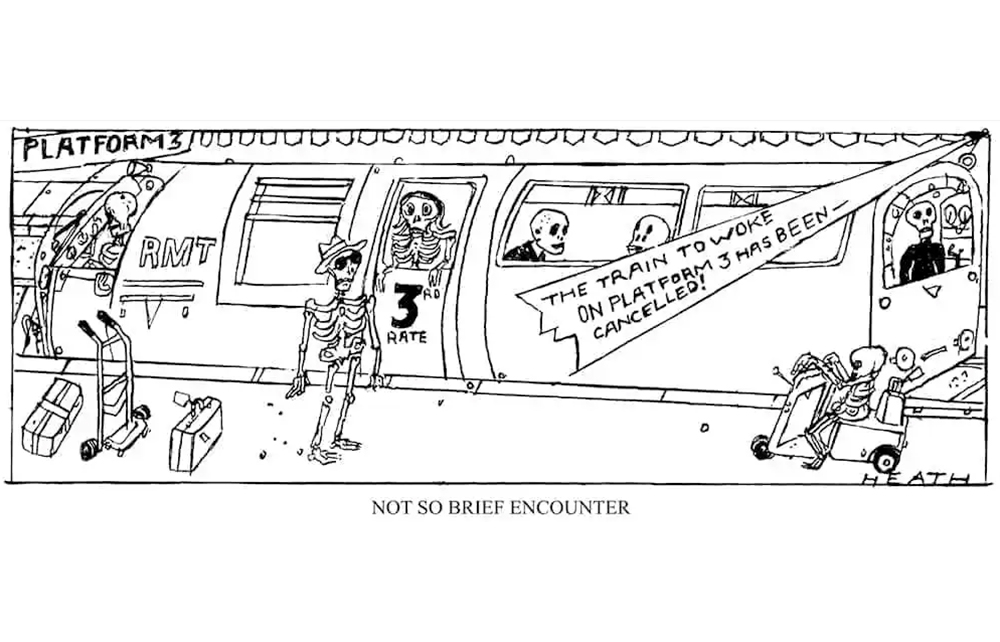The first LNER train I booked on Sunday from Durham to London was cancelled due to ‘action short of a strike’. I hadn’t heard the phrase before, but I instantly admired it. It’s so impressively confusing. With a strike, you know whose side you’re on. You can look up the salary of a train driver, for instance, discover that it’s £70,000 after only a few years of training, and become icily indifferent to their plight. But action short of a strike? What is it?
‘Action short of a strike’ turns out to be an ingenious way of screwing your boss while still getting paid
Action short of a strike, ASOS, turns out to be an ingenious way of screwing your boss while still getting paid. ‘It means members can incorporate strike action into their daily working life,’ says TESSA, the Transport Salaried Staff Association. Simply work the bare minimum and the inevitable result is confusion and delay, as the Fat Controller used to say, and as I found out on the second train I booked.
About an hour after that train left Durham it slowed and stopped in a field. ‘There’s been a failure on the electric line,’ said the loudspeaker, ‘but don’t worry. The driver will start up the diesel engine.’ A few minutes later the train began to move again. ‘See?’ I said to my seven-year-old. ‘What do I always tell you? You’re lucky. In the old days, we would have sweltered here for hours, no back-up engine, no phones.’ I never miss an opportunity to tell my son how much worse it was in the old days. He finds it uplifting.

Shortly after that, the train stopped dead just as it was leaving Thirsk station. The lights went off, the sockets died, the air con failed and the temperature began to rise. Other trains whisked past, so clearly the first fault was fixed, but we stayed put. Word from the next coach was that switching to diesel had somehow screwed both engines, but because there was no further communication from LNER no one knew for sure. In fact, at no time in what turned out to be a nine-hour detour did any LNER staff member offer passengers any information or any help. Action short of a strike. I’m warning you. It’s going to be a summer of fun.
At Durham station a disabled lady and her mobility scooter had been lifted on board with great bustle and care. The outing was a gift from her daughter, she’d told us. After two hours on the train with no information, the lady was scared. Would another train crash into us? How would she ever get off? Eventually our driver appeared, a woman of 30-odd, smiling: ‘Sorry! Sorry!’ she said, holding up her hands as if to say ‘My bad!’.
‘Please… are we safe?’ asked the dis-abled lady, but the driver didn’t stop. Action short of a strike. ‘Let me see what I can find out online,’ I said to the lady: there was bound to be something on social media. But all the LNER Twitter feed showed was a cartoon of a to-do list with the word ‘nothing’ on it, and the words: ‘That Sunday feeling!’ As I watched, another passenger posted a message: ‘This is appalling. Our train is without power at Thirsk station. We’ve been without it for two hours. People are fainting. Do something.’ After a moment, the LNER Twitter account tweeted again: ‘Did you know it’s #WorldEmojiDay?’ ‘Here’s the #Azuma emoji for your consideration. Which one would you choo-choose?’
‘Is this what it was like in the old days?’ asked my son. ‘Not really, darling, no.’
For something to do, my son and I walked down the train into the back coaches, which were still at the station platform. Every passenger was puce and sweating. An angry man had found an LNER guard and was grilling her. ‘Why can’t you open the doors and let some air in?’ She looked as if she might cry. ‘It’s impossible,’ she told him: ‘The automatic system won’t allow it because part of the train has left the station. Some of the doors would open on to the track. What if someone fell?’
‘What if that pregnant woman collapses? What if someone dies of heat exhaustion?’ said the man. Shortly afterwards the doors opened just fine and we all spilled out.
For the next two hours on platform 2 of Thirsk station there was a mood of old-fashioned solidarity among all 500 or so the passengers of the doomed Azuma. Children played tag on the platform edge while the adults marvelled at the lack of assistance. The LNER staff paced the platform briskly back and forth, trailing customers, trying to pick up enough speed to make questions impossible while not actually breaking into a run. I’ve seen horses do the same thing to stay ahead of flies. Pinned to the lapel of one guard’s waistcoat was a badge: ‘Be kind. I am someone’s daughter.’
At the far end of the platform, the driver had stopped for long enough to collect a circle of passengers. ‘You have three options as I see it,’ she said, ‘and none of them are good. You can hope that this train starts up again, but I can tell you it won’t. You can go over the bridge and catch the next train back north again, or you can get a taxi to York.’ The last option sounded best but it was out. No Thirsk taxi was prepared to take any passenger to York station for love nor money. Someone offered £200 for the 30-minute trip but nothing doing. In 2023 the usual rules of supply and demand are suspended.
‘But what does LNER advise us to do?’ As the sun began to sink, the voice of an older woman cut through the chat. It was the sort of voice that wears kirby grips and brooks no nonsense from spaniels. ‘I understand it’s not your fault, but you are nonetheless a representative of LNER. What is the plan?’ The crowd nodded gratefully in agreement and turned back to the driver. It was like watching the old world pitted against the new. ‘There is no plan!’ said the lady driver with that same odd smile. ‘You’re on your own. There’s no help coming, no bus or anything. You can ask LNER for compensation, but I’d be surprised if you get anything.’
Action short of a strike. The strangest thing was how pleased she looked.







Comments